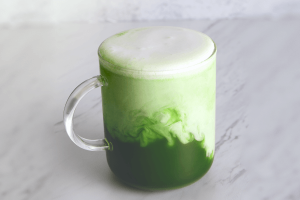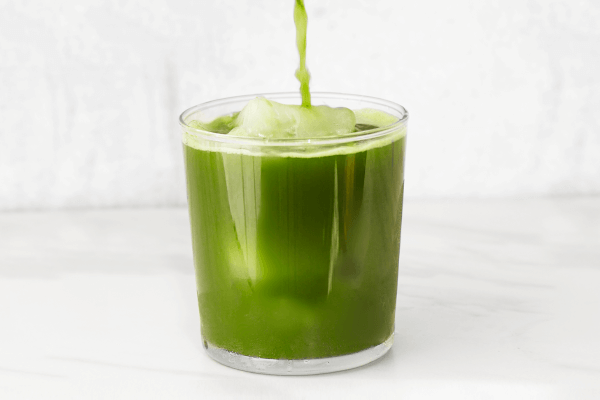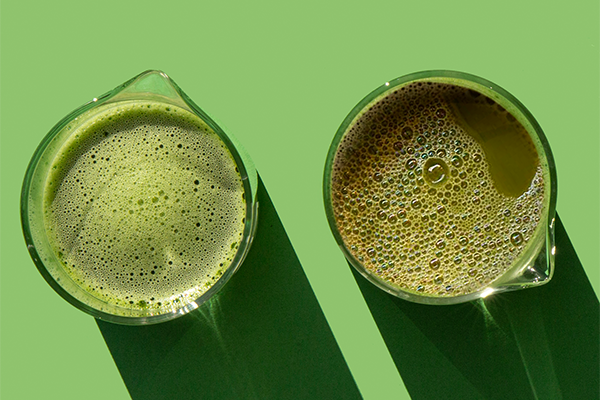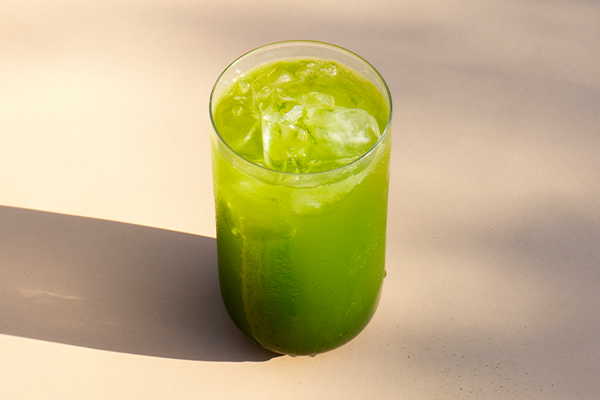You’ve probably heard all about the health benefits of matcha. Maybe you enjoy daily matcha to boost your energy levels with the calming focus of l-theanine. Awesome!
But this powerful green tea powder can have some negative consequences if you have too much, and it goes beyond mere caffeine intake.
Here’s what you need to know about the potential harmful side effects of matcha tea, and how to avoid them:

5 Potential Side Effects of Matcha
-
- Upset stomach
- Anemia
- Diarrhea
- Insomnia
- Exposure to toxic elements
-
Upset stomach
If you’ve ever experienced heartburn after drinking coffee first thing in the morning, you’re familiar with the effect of tannins. You may associate tannins with wine, but coffee and tea are rich in these compounds as well, and they serve a similar purpose.
The predominant tannin in matcha green tea is epigallocatechin gallate (EGCG, one of the good-for-you tea catechins). In addition to being antioxidants with the power to help neutralize free radicals, these polyphenols provide green tea’s astringent, dry taste.
However, when tannins hit an empty stomach, they can aggravate the already acidic environment, causing a sour stomach at best, and reflux, nausea and vomiting at worst. [1]
To avoid this, it’s best to drink your matcha (or even regular green tea) after a meal, or alongside some snacks… much how it is consumed in traditional Japanese tea ceremonies.
FYI, in the East, this is one of the commonly-known effects of green tea in general. In other words, the same thing can happen to you with cups of green tea. This is one reason we recommend starting your day with black teas, and deferring your consumption of green tea until you have some food in your belly.
-
Anemia
Catechins in green tea and matcha powder can bind with iron and prevent absorption. Drinking too much tea over a long period of time can lead to iron-deficiency anemia. Studies vary on the upper limit, but it’s safe to consider anything over 8 cups per day excessive.
Iron is a vital component of our red blood cells, which transport oxygen around the body. When iron levels run low, you may experience fatigue, general weakness, pale skin, and increased heart rate. [2]
Typically, drinking green tea is not a significant risk for anemia if done in moderation, and if you’re getting enough iron from your diet.
If you’re drinking more than 8 cups of green tea (or matcha) a day, however, you may want to talk to your doctor about your iron levels.
-
Diarrhea
One of matcha green tea’s touted health benefits is its ability to rev up metabolism and inhibit fat absorption — two mechanisms that may support healthy weight management, support cardiovascular health, and help to regulate blood sugar levels. That’s why they call it a “superfood!”
But impaired fat absorption can have unpleasant consequences. If fat isn’t being broken down utilized or stored by our body’s cells, our body has to get rid of it some other way. Unabsorbed fat ends up passing through the digestive system and becomes incorporated in stool. Fatty stools don’t bind up so well, resulting in diarrhea. [3][4][5]
This can also be exacerbated by the caffeine in matcha, which can make indigestible food pass through your systems even faster.
If you’re experiencing this issue, consider cutting back your matcha habit if you’re having more than 2 cups per day, or increase the fiber in your diet.
-
Insomnia
Matcha’s caffeine content ranges from 70 to 140mg of caffeine… not too far off from a cup of coffee, which can contain 95 to 200mg. Drinking too much matcha or drinking it too close to bedtime can make it more difficult to fall asleep or achieve restful sleep. Over time, not getting enough zzz’s can start to seriously impact overall health and wellness.
Bottom line: sleep is as important as a healthy diet and exercise for your physical health. When it comes to the energy-boosting effects of matcha, too much of a good thing can be bad.
As with any caffeine-containing beverage, breastfeeding and pregnant women should avoid it altogether.
-
Exposure to toxic elements
This side effect stems from the environment that the camellia sinensis tea plant is grown in. Lead, arsenic and fluoride have all been identified in the soil where some of these tea plants grow, and these chemicals make their way into the green tea leaves themselves.
With regular brewed green tea, they pose less of a threat because only a very small amount infuses into the hot water. But utilizing the entire leaf to make matcha means consuming higher levels of potentially harmful substances.
Especially if you are consuming matcha daily, you’ll want to make sure you’re choosing organic matcha that is also screened for these toxins and heavy metals.
Our Sun Goddess Matcha is Quadruple Toxin Screened to ensure purity:

Pique Sun Goddess Matcha
The world’s purest matcha, crafted to the highest standards of the finest ceremonial grade matcha. Designed for mindfulness. A mug full of zen.
The Takeaway
Don’t stash your bamboo whisk just yet. Most of these possible side effects only appear if you are drinking matcha in large amounts, to excess.
When enjoyed in moderation, matcha’s health benefits far outweigh its risks!






